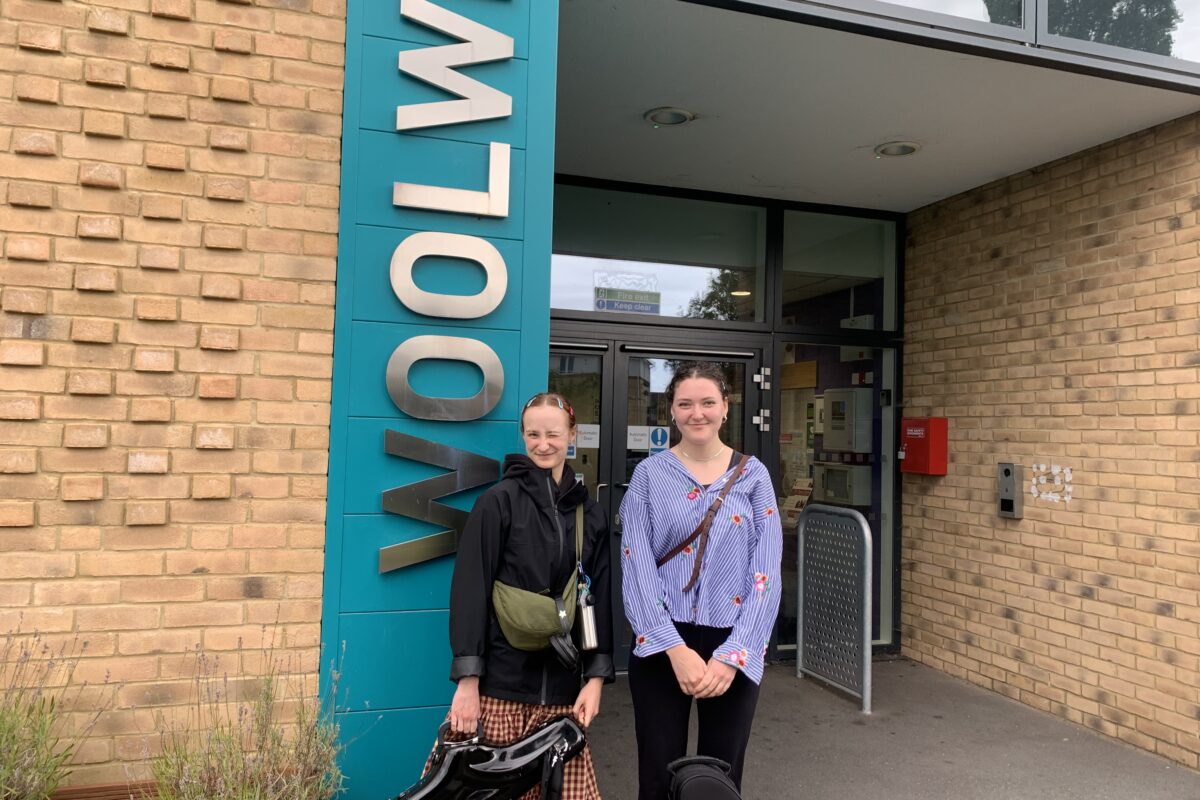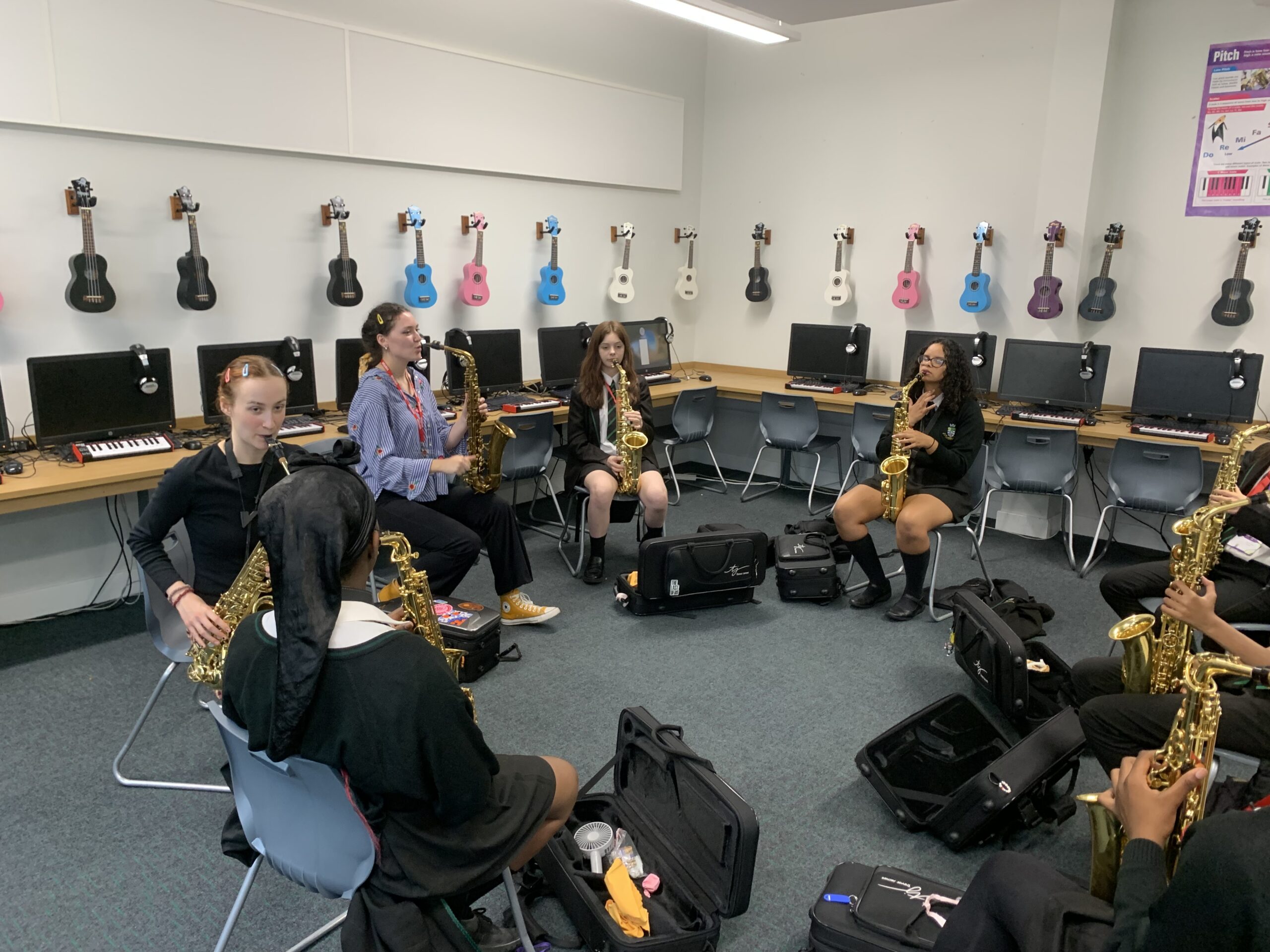This November, we’re reflecting on the first year of our Sound Foundations project. Every week for the last two school terms, two NYJO Emerging Professionals, Flo Redmonds and Lydia Cochrane, have been teaching the saxophone at Woolwich Polytechnic School for Girls in Thamesmead.
What’s unique for us about the project is that not only were all the Years 8s and 9s in the scheme complete beginners, but they were provided with brand-new instruments, for free. It’s an initiative designed to address inequalities in accessing music education by removing the cost of instruments as now, having stuck with the lessons for the year, their saxophones are theirs to keep, no strings attached. Young people have now restarted lessons after the Summer break: several have already joined the school’s Concert Band; many will join the new group in our Saturday Under 18s programme at Woolwich Works; all have a new hobby and an instrument for life.
Sound Foundation is truly first-access, truly accessible music education. At the start of the project, participants were selected by their teachers and schools as young people in receipt of Pupil Premium who would particularly benefit from music-making in their lives. All were completely new to their instruments, which we had purchased through a combination of a charitable partnership with Trevor James instrument manufacturers and a grant from the Hobson Charity. Our sincere thanks go to both.
As for the two NYJO musicians group leaders, they got started with training by NYJO Educators Vij Prakash and Andy Grappy:
It was really special to be provided with training sessions before we started the actual teaching, as it gave us a unique opportunity to really curate a special learning experience for the young people at Woolwich Poly[technic School for] Girls. As someone who came up through state school music services myself, teachers usually don’t have the time or resources to devote themselves to their students to such an extent, so it really is a pleasure to be able to start off feeling so well prepared and supported. – Flo Redmonds, saxophone leader
One term in, young people already told us that they were progressing quicker than they would have done with one-to-one lessons, as their teamwork and confidence grew. They rated their confidence playing in front of others and in sharing their ideas with the group as an average of 7/10, their confidence in their own creativity as 8/10, and their confidence playing together as 9/10.
They also told us about their personal growth:
I get to express myself and I have found a more energetic side in me.
I love having a break after a long Monday, and I have genuinely found a hobby I enjoy.
Knowing that I can play the music I listen to is much more exciting!

In observing sessions, it was immediately clear that the young musicians running the groups had become more than just musical leaders, but role models for these young people more broadly. It was amazing not just to see a group that were so recently beginners handling the tricky Bossa Nova time-feel of a tune like ‘The Girl from Ipanema’ or the swinging head of ‘C Jam Blues’, taught completely by ear; but also to witness their trust in the leaders, and the confidence and courage it brought out.
There’s one young person who was really quiet at first, really didn’t get involved that much and didn’t really talk to anybody else. And then just after a few weeks, they started to just progress a bit faster than everybody else. They started talking a little bit more. They started putting their hand up to demonstrate things a lot more, and it’s just reached a point now where they talk loads. Whenever I say, “does anybody want to show the class what you’ve practised,” they’ve always got their hand up. But it’s just seeing them come out of their shell and you can tell that it’s become something very important to them quite quickly. And they’re the one who practises almost too much, probably more than I practise, but it’s been amazing to see that happen. – Flo Redmonds, saxophone leader
I’m so proud for us to be mentors to these girls as we see them grow as musicians. To see the progress they have made already, not just on the saxophone but also in their confidence in the group, has been wonderful and quite an emotional thing! I am so aware of how I wouldn’t be where I am today without having had access to similar schemes to Sound Foundations, and I couldn’t imagine my life having not been lucky enough to have musical education, so I’m so grateful and excited to be able to pass on some of the same feeling and experience to the new generation of players! – Lydia Cochrane, saxophone leader
We’re excited for the next year, and beyond, as Sound Foundations is really just the first step on a lifelong journey with music. These young people can join the school Concert Band; make music with their friends; dive deeper into their instruments at home; and starting in 2025, join our new Saturday group. Run by older musicians just like Sound Foundations, NYJO First Collective will be our third weekly ensemble, an improvisation session aimed at younger and less-experienced players.
First Collective is a crucial part of the project, since we don’t subscribe to the view that young people can only start making real music once they’ve completed a certain number of years practising or gained certain qualifications. As soon as you feel comfortable navigating the technology of your instrument and confident using it as a tool to make sound, you’re ready to start truly creating and collaborating with others. Training as a musician means two things: closing the gap between the sounds you hear in your head and being able to produce them on your instrument, and developing your listening and creativity in hearing those sounds in the first place.
From Sound Foundations to First Collective, young people will build both skills and be able to progress into existing groups: Winston Clifford’s Ensemble and Olivia Murphy’s Band. Eventually, they could be performing live on stage with the Under 18s, and when they’re 18 they can choose to become a NYJO Emerging Professional and take their music further. One day, they could be running sessions like these themselves for people in their position now, and sharing their sounds and stories with the rest of the jazz world.

